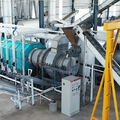In the realm of sustainable practices, biochar emerges as a key player in fostering a virtuous cycle of carbon. This carbon-negative material holds immense potential in mitigating climate change while enhancing soil fertility and agricultural productivity. Understanding the intricacies of the biochar production process is crucial to grasp its role in carbon sequestration and soil improvement.
The Science Behind Biochar
Biochar is a carbon-rich material produced through the pyrolysis of organic biomass, such as agricultural waste, forestry residues, or even certain types of manure. This thermal decomposition process occurs in the absence of oxygen, preventing the complete combustion of the biomass. The resulting biochar is a stable form of carbon that can persist in soil for hundreds to thousands of years.
Carbon Sequestration
One of the primary functions of biochar is its ability to sequester carbon from the atmosphere and store it in a stable form. During the pyrolysis process, organic biomass undergoes thermal decomposition, releasing volatile compounds such as methane and carbon dioxide. However, by preventing the complete combustion of the biomass, biochar production retains a significant portion of the carbon in the resulting biochar.
Soil Amendment
Beyond carbon sequestration, biochar serves as a potent soil amendment, enhancing soil structure, nutrient retention, and microbial activity. When incorporated into soil, biochar acts as a porous matrix, providing habitat for beneficial microorganisms and improving soil aeration and water retention. Additionally, biochar possesses a high cation exchange capacity, effectively retaining essential nutrients and preventing leaching.
The Virtuous Cycle of Carbon
Carbon Sequestration and Soil Fertility
The integration of biochar into agricultural systems initiates a virtuous cycle of carbon. As biochar sequesters carbon from the atmosphere and stores it in soil, it simultaneously improves soil fertility and productivity. Enhanced soil fertility leads to increased plant biomass, which in turn provides more organic matter for biochar production. This continuous cycle of carbon capture and soil improvement contributes to long-term sustainability and resilience in agricultural landscapes.
Reduced Greenhouse Gas Emissions
Moreover, the use of biochar in agriculture can lead to a reduction in greenhouse gas emissions. By enhancing soil fertility and nutrient retention, biochar reduces the need for synthetic fertilizers, which are significant sources of greenhouse gases such as nitrous oxide. Additionally, the carbon stored in biochar remains sequestered in soil, preventing its release into the atmosphere as carbon dioxide.

Advancements in Biochar Production Technology
Continuous Pyrolysis Systems
Recent advancements in biochar production technology have focused on improving efficiency and scalability. Continuous pyrolysis systems enable the continuous feeding of biomass into the pyrolysis reactor, resulting in higher throughput and reduced energy consumption. These systems utilize innovative designs and automation to optimize the biochar production process while minimizing environmental impact.
Integration with Renewable Energy Systems
Furthermore, biochar production can be integrated with renewable energy systems to enhance sustainability. By utilizing waste heat from biomass combustion or solar energy, biochar production processes can operate with minimal external energy inputs. This integration not only reduces the carbon footprint of biochar production but also maximizes resource efficiency.
Applications of Biochar in Agriculture
Soil Remediation
Biochar has been widely utilized for soil remediation in degraded or contaminated environments. Its porous structure and high surface area make it effective for adsorbing pollutants and immobilizing heavy metals in soil. By incorporating biochar into remediation strategies, it is possible to restore soil health and mitigate environmental degradation.
Carbon Farming
In the context of carbon farming, biochar plays a crucial role in enhancing soil carbon sequestration and mitigating greenhouse gas emissions. By integrating biochar into agricultural practices such as no-till farming or cover cropping, farmers can enhance soil carbon storage while improving crop yields and resilience to climate change. This approach aligns with sustainable agricultural principles and contributes to climate change mitigation efforts.
Conclusion
Biochar represents a paradigm shift in carbon management, offering a sustainable solution to mitigate climate change while enhancing soil fertility and agricultural productivity. Through the biochar production process, carbon is sequestered from the atmosphere and stored in a stable form, initiating a virtuous cycle of carbon in agricultural landscapes. Advancements in biochar production technology and its diverse applications in agriculture further underscore its potential to promote environmental sustainability and resilience. As we strive towards a carbon-neutral future, biochar stands as a beacon of innovation and hope in the fight against climate change.




